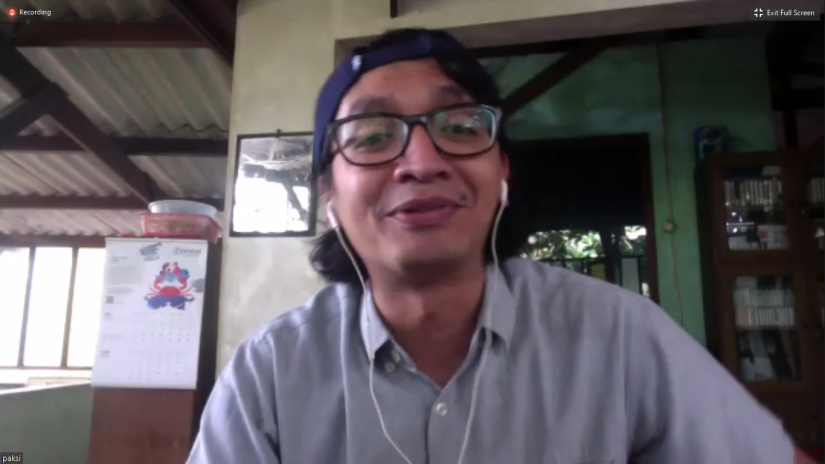
Yogyakarta, October 22nd 2020—Sociopreneur Muda (Soprema) Fisipol UGM held a webinar Bincang Soprema entitled ‘Sociopreneur Dynamics in the Middle of the COVID-19 Pandemic’ on Wednesday (21/10). This webinar was held online on Zoom and presented two speakers. Both of the speakers were Resta Aqabah Amjad, Sirvano Consulting and Paksi Raras, social activist of Jogja Lawan Corona. The moderator of this webinar was Eka Zuni Lusi, a lecturer of the Department of Social Development and Welfare of Fisipol UGM.
Paksi as the first speaker told about the movement that was initiated by him and his friends, that is Jogja Lawan Corona. The emergence of the movement in the early days of the outbreak of COVID-19 in Indonesia, when medical personnel had difficulty obtaining personal protective equipment (PPE). So, an idea emerged among Paksi and his friends to produce PPE and donate it for free to medical personnel in need.
Within a few days donations and assistance arrived, both from residents of Yogyakarta and other regions. ‘“The assistance and donations from various other regions were also extraordinary,” Paksi said. In fact, Paksi said that several friends who are engaged in distro participated in producing PPE, a total of 34 SMEs distro were involved. From here, they could produce 25 thousands of free PPEs in the last June. He explained that one hundred percent of the incoming donations were used for production costs and were donated throughout Indonesia.
From this movement, Paksi felt that it had received two benefits. First, from a social perspective, they were able to distribute PPE throughout Indonesia. Second, the industries of some SMEs were running even though they switched from the clothing industry to the PPE industry. “So, the operations that we have to bear are covered from it, even though we don’t make a profit,” Paksi said. He also admitted that even though the movement was spontaneous, the support provided by the community was extraordinary.
Differ to Paksi who managed SMEs, Retas Amjad talked about how Shirvano, the architectural and planning consulting firm he works for, has survived the pandemic. At least there were four solutions that have been carried out by Retas with his team since last July. Those solutions were: internal research, creating guidelines during and post pandemic, sharing therapy, and branding and market penetration.
Furthermore, Retas explained that the research was initially carried out to all teams. This research includes, when are the effective hours, how the work patterns at home and at the office. Then, after the data had been collected, guidelines, directives, and work standard operating procedures (SOPs) were created during the pandemic. On the other hand, Retas also talked about pandemic therapy. For him, in this difficult time, sharing will actually make him happy and grateful. “That makes us grateful and keeps our spirit that there is still a future,” he added. Some examples of the sharing activities were: sharing to several mosques; making campus master plans for free in Sumbawa and Sembalun, West Nusa Tenggara; as well as collecting donations through online discussions.
Retas also revealed that a strategy is needed to adapt to this pandemic. According to him, company strategies that are capable of developing and growing are those that are progressive, not sluggish, and penetrate the market. He admitted, the pandemic made the unrealistic businesses and not total yet to be locked, survive or bankrupt. Even so, he did not deny that there would be a way for those who wanted to survive. “The pandemic will also pave the way for those who are optimistic, adaptive, keep growing, and smart in looking for opportunities,” he said.
